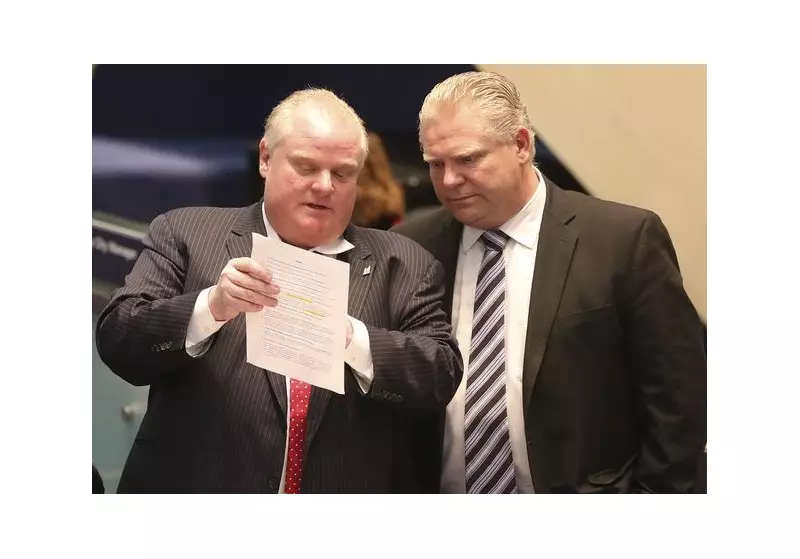
Ontario Premier Doug Ford frequently dominates headlines with high-profile announcements, from liquor policy changes to trade disputes. However, his management of Ontario's finances - which impacts every resident of the province - receives considerably less scrutiny despite its profound implications.
The Ford Family Political Legacy
The Ford family represents a political dynasty in Ontario politics, spanning multiple generations. Doug Ford and his late brother Rob, the former Toronto mayor, come from a family deeply embedded in public service, including their father Doug Sr. and nephew Michael, both of whom have served at Queen's Park. The family has built its reputation on populist principles, consistently advocating for tax reduction and expressing skepticism toward government expansion.
Despite this family tradition, Doug Ford's performance as premier stands in stark contrast to his brother Rob's approach to fiscal management during his tenure as Toronto's mayor.
Rob Ford's Fiscal Achievements as Mayor
Rob Ford assumed office in 2010 following a campaign centered on his promise to stop what he famously called the city's "gravy train." He backed this rhetoric with substantive policy actions that demonstrated genuine fiscal restraint.
During his mayoral term, Rob Ford achieved several significant financial accomplishments: he eliminated approximately $600 million from the city's budget, successfully privatized garbage collection services, abolished the municipal vehicle registration tax, maintained property tax increases below inflation rates for three of his four years in office, and managed the city's debt accumulation at a substantially lower rate than both of his successors.
Rob Ford often contrasted his approach with that of his predecessor, David Miller, who had increased municipal spending, raised existing taxes, and implemented new ones. Interestingly, while Doug Ford served as a city councillor during his brother's mayoral administration, his policies as premier more closely resemble Miller's approach than his brother's fiscally conservative model.
Doug Ford's Spending Record as Premier
Since assuming the premier's office in 2018, Doug Ford has presided over a substantial expansion of Ontario's financial obligations. Under his leadership, the provincial government's net debt has grown by $104.0 billion nominally, representing a 7.3 percent increase after accounting for inflation. This year, Ontario's debt is projected to reach $460.7 billion, the highest debt level in the province's history when adjusted for inflation.
The analysis reveals that program spending - calculated as total government expenditures minus debt interest costs - has increased from 17.3 percent of provincial GDP in 2017 to 18.0 percent in 2024. After adjusting for both inflation and population growth, per-person program spending has risen from $12,754 to $13,463 since Doug Ford became premier.
Despite his frequent criticism of former Premier Kathleen Wynne, whom he regularly characterized as an irresponsible spender, Doug Ford has actually increased government spending by every measurable standard.
Broken Tax Promises and Fiscal Management
On taxation, Premier Ford has failed to deliver on key campaign commitments. He broke his promise to reduce Ontario's business income tax rate from 11.5 percent to 10.5 percent, and similarly reneged on his commitment to lower the middle personal income tax rate. His tax initiatives have been limited to minor measures, including a temporary gas tax reduction and rebate cheques sent to Ontario residents.
Meanwhile, government revenues have grown from 18.3 percent of provincial GDP to 19.2 percent during Ford's tenure, despite his repeated assertion that "the worst place you can hand your money over is to the government."
The Ford government has recorded budget deficits in six of its seven years in power and plans to continue this pattern with at least two additional deficits projected for 2025 and 2026.
Brothers Ford: A Study in Contrasts
While acknowledging the significant differences between municipal and provincial governance, the fiscal records of the Ford brothers reveal a remarkable divergence in approach and outcome. Rob Ford demonstrated genuine fiscal discipline through tangible spending restraint, tax reductions, and controlled debt accumulation.
In contrast, Doug Ford has substantially expanded Ontario's government apparatus, failed to deliver on key tax commitments, and continues to authorize spending beyond the province's means while adding to Ontario's already substantial debt burden.
The evidence suggests that if Doug Ford had adopted his brother Rob's fiscal strategies, Ontario's financial situation would be considerably healthier today. The analysis, conducted by Fraser Institute analysts Alex Whalen and Jake Fuss, underscores this striking contrast between the two brothers' approaches to public finance.





